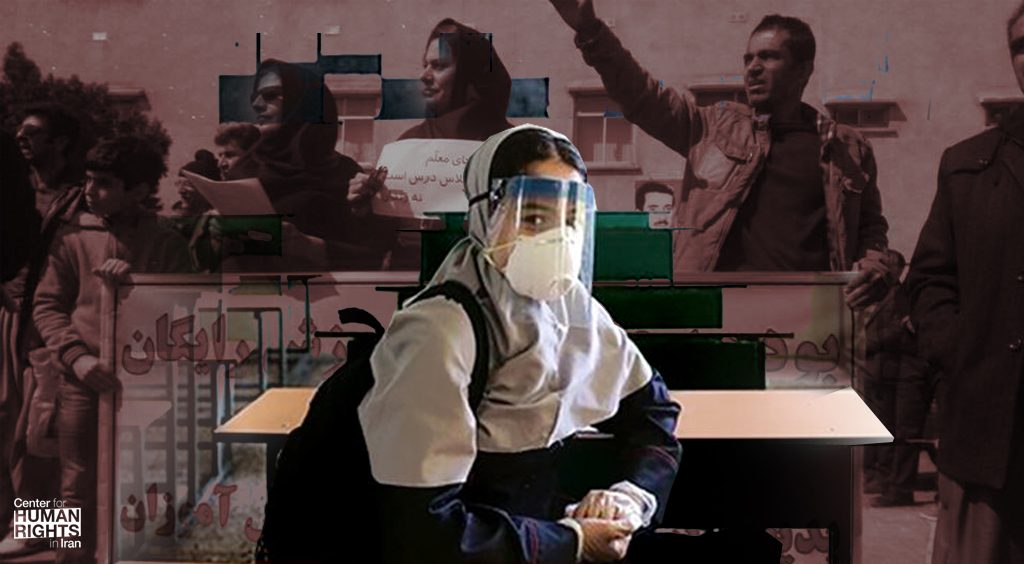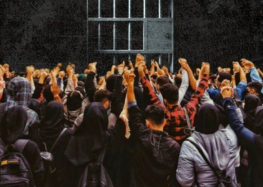Teachers in Iran Continue Protests Under New Raisi Government
 With Iran’s new academic year, beginning on September 23, 2021, just around the corner, teachers have been protesting in front of Parliament and the Plan and Budget Organization in Tehran to voice anger and frustration over low pay and serious challenges including state repression against students and teachers.
With Iran’s new academic year, beginning on September 23, 2021, just around the corner, teachers have been protesting in front of Parliament and the Plan and Budget Organization in Tehran to voice anger and frustration over low pay and serious challenges including state repression against students and teachers.
Teachers are currently the most organized labor sector in the country and have been demanding the full implementation of Article 30 of Iran’s Constitution, which requires the government to “provide all citizens with free education up to secondary school.”
This demand is particularly important now that various school fees have been repelling some families, particularly from working-class and poor neighborhoods, from sending their children to school.
Another issue that prompted the demand is the alarming drop in student attendance numbers as classes moved online during the COVID-19 pandemic, leaving many students who couldn’t afford digital devices and home internet connections without access to education.
The pandemic has had a devastating impact on students from low-income families who can barely afford enough food not to mention computers or phones that would enable access to online classes during school closures.
According to Deputy Education Minister Aliakbar Haghdoust, “25 percent of students have quit school because they don’t have a smartphone.”
State Reaction to Teachers’ Demands: Repression
In one of his first decisions after being elected president in June 2021, conservative President Ebrahim Raisi blocked an increase in teachers’ salaries that had been approved by the previous government.
According to Masoud Mirkazemi, the head of the Plan and Budget Organization, the increase would have been “very difficult” to implement given the current massive budget deficit.
In response, teachers staged protests. On September 5, 2021, large groups of teachers gathered in front of Parliament chanting that “the poverty line is 12 million tomans [approximately $2,8033 at the time], our salary is 3 million tomans [$708].”
Then on September 14 teachers gathered in Tehran and several other cities to demand the government reinstate previously promised pay increases.
Yet despite teachers’ history of strong organization and protest in the Islamic Republic, the government has consistently failed to meet their demands while intimidating and imprisoning the loudest teachers’ advocates.
After Iran’s 1979 revolution, teachers began to organize in the late 1990s, with the Iranian Teachers’ Trade Association (ITTA) pursuing higher pay amid rising inflation.
The government’s lack of response led to massive protests in 2007, with thousands of teachers from many cities to the capital congregating in front of Parliament and the Ministry of Education.
Since then, the Iranian government has treated advocates of teachers’ rights as a security threat, meting out harsh punishments against their leaders and activists and temporarily suspending the ITTA’s license.
Between 2019 and 2014, at least four teachers were given the death sentence for alleged activities against the state, and three of them were executed: ethnic Arabs Hadi Rashedi and Hashem Shabaninejad and Kurdish activist Farzad Kamangar.
Meanwhile, prominent teachers rights activists including Hashem Khastar, Rasoul Bodaghi, Mahmoud Beheshti Langroudi, and Ali Akbar Baghani were given long prison sentences for their peaceful struggles to defend the rights of their colleagues.
Despite promising a more tolerant approach to protests, President Hassan Rouhani’s two terms as president (2013-2021) included ongoing suppression of teachers who advocated improved pay and student education.
Two months after organizing a major protest in April 2015, ITTA Secretary-General Esmail Abdi was arrested by the Islamic Revolutionary Guard Corps’ Intelligence Organization and subsequently sentenced to six years in prison.
He was due to be freed in November 2020 but remains behind bars as the judiciary enforced a suspended 10-year prison sentence issued in the fall of 2010 for “gathering information with the intention to disrupt national security” and “propaganda against the state.”
In June 2018, senior ITTA member Mohammad Habibi and several other teachers were arrested for their participation in a major rally in front of the Ministry of Education.
Habibi was imprisoned for more than two years on national security charges and released in November 2020.
Shortly after the start of the academic year in October 2018, the Iranian Teachers Organizations’ Coordinating Council organized a nationwide strike to demand reforms in Iran’s education system, freedom for imprisoned colleagues, and fair salaries.
The council’s call for action addressed the government’s refusal to listen to teachers’ demands while working to replace teachers with religious leaders.
“Instead of confronting society’s thieves and corrupt elements, the security agencies and the judicial branch are threatening, banishing, expelling, and jailing justice-seeking teachers,” said the statement.
Due to Iran’s deteriorating economic conditions, in recent years teachers have mainly focused their demands on improving their livelihood but they have also been opposing “ideological education” in schools.
This was prompted by the Education Ministry’s announcement in February 2021 that it would hire 25,000 young clerics to teach various courses including history and sociology.






